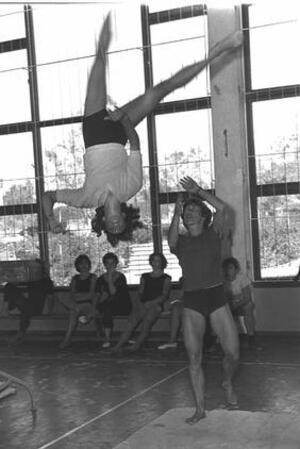Agnes Keleti
Former Olympic gymnast Agnes Keleti training a student at the Wingate Institute in Israel in 1960. Image courtesy of the Israel National Photo Collection via Wikimedia Commons.
In 1944, when the Germans invaded Hungary, gymnast Agnes Keleti bought fake identification papers and carried the bodies of the dead to mass graves every morning during the battle of Budapest. After the war, she returned to gymnastics, winning nine more national titles and competing internationally, but an injury sidelined her for the 1948 Olympics. In the 1952 Olympic Games in Helsinki, she won four medals, but the high point of her career was the Melbourne Olympics of 1956, where 35-year-old Keleti won a slew of medals, including four gold medals for uneven parallel bars, balance beam, floor exercise and combined exercise-team. With a Communist takeover of Hungary looming, Keleti defected and settled in Israel in 1957.
Born on January 9, 1921, in Budapest, Hungary, Agnes Keleti is the most successful Jewish female athlete in Olympic history. With ten Olympic medals from three Olympic Games, she stands third all-time among women for the most Olympic medals in gymnastics. A member of the Hungarian Sports Hall of Fame and the International Women’s Sports Hall of Fame, she was also inducted into the International Jewish Sports Hall of Fame.
Early Life and World War II
Agnes Keleti was born on January 9, 1921, in Budapest, Hungary, to Franz (Ferenc) and Rosa (Rosza) Klein. Franz was partner in a factory, and the family led an assimilated lifestyle and enjoyed skiing, traveling, and attending the opera.
Keleti began her gymnastics training at the age of four at Budapest’s Jewish club and by the age of sixteen had won the first of her ten national titles. With the German invasion of Hungary in 1944, Keleti’s training came to an abrupt halt. To survive World War II, she bought the papers of a Christian girl and worked as a furrier and as a maid for a Nazi-sympathizing family in a small Hungarian village. She also worked in an ammunition factory. During the battle for Budapest in the winter of 1944–1945, she did morning rounds to collect the bodies of those who had died the previous day and place them in a mass grave.
Keleti’s mother and sister went into hiding and were saved by the Swedish diplomat Raoul Wallenberg. Her father, however, was sent to Auschwitz and eventually perished there, along with the rest of the Keleti family. Because she had heard a rumor that married women were not taken to labor camps, she hastily married Istvan Sarkany, an outstanding gymnast of the 1930s who achieved national titles and took part in the 1936 Berlin Olympics.
Gymnastics Career
At the end of the war Keleti returned to her gymnastics career. Between 1947 and 1955 she was the dominant force on the national scene and was equally impressive in the international competitions in which she represented Hungary twenty-four times between 1947 and 1956. A serious injury two days before she was to compete in the 1948 Olympic Games in London prevented her from active participation. Nevertheless, as a member of the Hungarian gymnastics team, which finished second in the team competition, she was awarded a silver medal—her eleventh.
At the World University Games of 1949 Keleti won four gold medals, a silver, and a bronze. A greater test awaited her at the 1952 Helsinki Olympic Games, at which, at the age of thirty-one, Keleti won four medals: a gold (floor exercise), a silver (combined team event), and two bronze (uneven parallel bars and hand apparatus-team) and placed fourth (balance beam) and sixth (combined exercises). If her performance was remarkable in 1952, it was overshadowed by an even more formidable display of talent, determination and ability in the 1954 World Championship. She finished first on the uneven bars and the hand apparatus team, second in the combined team and third on the balance beam.
This performance was still not the high point of her career, which came at the Melbourne Olympics in 1956: the thirty-five-year-old Keleti scored an astounding triumph, winning four gold medals (uneven parallel bars, balance beam, floor exercise and combined exercise-team) and two silver medals (individual and team all-around competitions). Keleti perceived this as the end of her career and indeed it proved to be so, for as the Olympics were in progress, the anti-Communist revolution raged in Hungary, only to be overcome by the Russians.
Defection and Later Life
Instead of resuming her life as a sport legend in her native land, Keleti chose to defect. Together with some forty other Hungarian athletes, she won asylum in Australia, where her sister had moved after World War II. After working as a factory hand for six months, she returned to Europe in 1957. An Israeli emissary invited her to participate in the fifth Maccabiah Games that year and she subsequently settled there, her mother and sister joining her.
Keleti became a coach of the Israeli national gymnastics team and a physical education teacher at the Wingate Institute for Physical Education and Sport, imparting her enormous knowledge and experience to admiring young gymnasts. Described by a former student who later became her colleague at Wingate as “the foundation stone of gymnastics in Israel,” Keleti purchased equipment hitherto unknown in the country. She was inducted into the International Gymnastics Hall of Fame in 2002.
In 1959 Keleti married Robert Biro, a Hungarian physical education teacher whom she met in Israel. The couple have two sons: Daniel (b. 1963) and Rafael (b. 1964).
The USC Shoah Foundation has a collection about Agnes Keleti, including almost 150 photographs from her life that are available online and a 2-hour interview with Keleti that is not available online. The interview code is 39566 and is in Hebrew.
Galily, Yair. "Sport, politics and society in Israel: The first fifty-five years." Israel Affairs 13, no. 3 (2007): 515-528.




